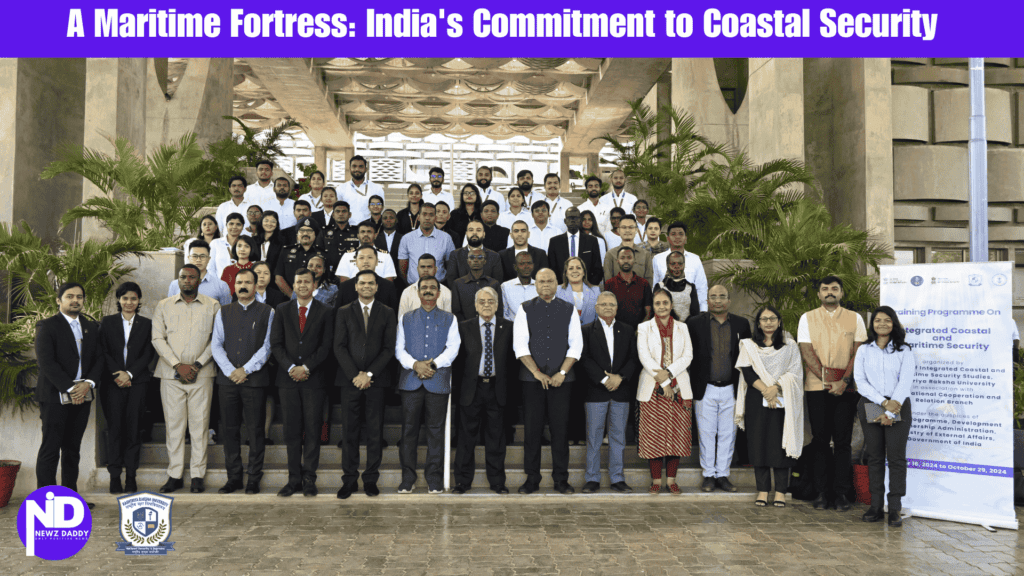A Maritime Fortress: India’s Commitment to Coastal Security
Newzdaddy Education Updates
Synopsis of the Article
- Indian Navy’s Commitment: The Indian Navy is dedicated to safeguarding and promoting India’s maritime interests.
- Regional Cooperation: The Vice Chief of the Naval Staff emphasized the need for regional cooperation to address maritime security challenges.
- Indian Navy’s Role: The Indian Navy plays a significant role in ensuring maritime security in the Indian Ocean Region (IOR).
- Maritime Crimes: The Indian government has a legislative framework to prevent and apprehend maritime crimes.
- UNCLOS: India advocates for respect for international law and peaceful settlement of disputes in accordance with the United Nations Convention on the Law of the Sea (UNCLOS).
- Rashtriya Raksha University: The university serves as a platform for capacity building, information exchange, and knowledge sharing on maritime security.
- Emerging Threats: Piracy, smuggling, climate change, and sea level rise pose significant threats to maritime security.
- School of Integrated Coastal and Maritime Security Studies: The school has made significant contributions to the field of coastal and maritime security law and governance.
India’s Naval Might and Commitment to Maritime Security
India is a maritime country with a long-standing relationship to the ocean. It is an important participant in international maritime issues due to its long coastline and advantageous location in the Indian Ocean. India’s maritime force, the Indian Navy, is dedicated to defending and advancing the nation’s maritime interests.
Admiral Dinesh K. Tripathi, the Chief of Naval Staff, reiterated the Indian Navy’s steadfast dedication to defending India’s maritime security on October 16, 2024. He stressed the Navy’s readiness to respond to all threats, anytime, anyplace, and in any way, during his speech at Rashtriya Raksha University.
The Need for Regional Cooperation
Vice Admiral Krishna Swaminathan, the Vice Chief of Staff, emphasized the value of regional collaboration in tackling the escalating problems related to maritime security. He underlined that threats to maritime security are global and interdependent, and necessitate coordinated global responses.
Indian Navy’s Role in the Indian Ocean Region
The Indian Navy has made a significant contribution to the Indian Ocean Region’s (IOR) security, stability, and peace. It has carried out multiple operations against maritime dangers such as terrorism and piracy. Additionally, the Navy has helped nations in the area with disaster relief and humanitarian aid.
Combating Maritime Crimes
To stop and catch marine criminals, the Indian government has taken major action. It has passed laws and rules to deal with matters like illicit fishing, smuggling, and piracy. Patrolling the coastal seas and stopping maritime crimes is a critical function of the Indian Coast Guard, which collaborates with the Navy.
Must Read:
RRU Brings Peace: Vipassana Session at Manotsav’24 Marks World Mental Health Day
Respect for International Law
Respect for international law, especially the United Nations Convention on the Law of the Sea (UNCLOS), has long been a priority for India. UNCLOS establishes rules for using the oceans and governs pursuits including fishing, resource research, and navigation. India thinks that peace and stability in the marine sphere depend on compliance with UNCLOS.
Rashtriya Raksha University: A Hub for Maritime Security
One of the top universities in the nation for maritime security is now Rashtriya Raksha University. Professionals from all over the world can enroll in specialized training programs and research opportunities offered by the university’s School of Integrated Coastal and Maritime Security Studies. The school is a useful tool for practitioners in maritime security because of its emphasis on information sharing, capacity building, and international cooperation.
Emerging Threats to Maritime Security
The risks to marine security are always changing. Terrorism, smuggling, and piracy remain serious issues. Furthermore, rising sea levels and climate change provide further difficulties for marine security. Weather patterns, ocean currents, and sea temperatures are all being impacted by climate change, which may affect shipping lanes and maritime activities. Communities and infrastructure along the shore are also in danger due to rising sea levels.
The School of Integrated Coastal and Maritime Security Studies
The field of coastal and maritime security legislation and governance has benefited greatly from the work of Rashtriya Raksha University’s School of Integrated Coastal and Maritime Security Studies. Research has been done on a variety of subjects by the teachers and students at the school, such as marine law, maritime policy, and maritime security tactics. The research conducted by the school has influenced governmental choices and helped to create industry best practices for marine security.
Must Read:
“Unforgettable Sportsmanship at Sainik School’s 61st Athletic Meet”

